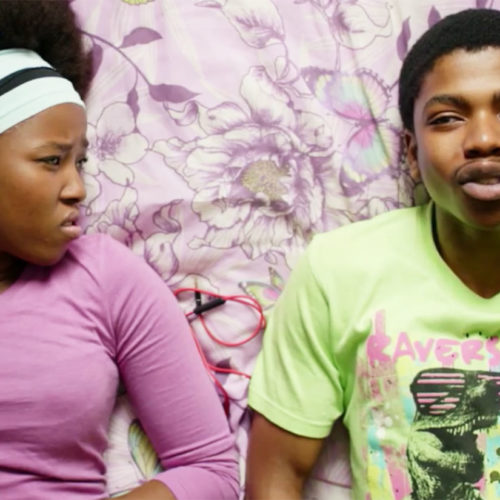This Psychologist Gives Advice On Coming Out To Family
Coming out to family… It’s never simple, is it?
But whether you’re a teen coming out to parents, a parent coming out to children, or a young adult coming out to your little brother, sister or elderly relative, ‘knowing your audience’ is key.
That’s according to Professor Janet Reibstein of the University of Exeter, pictured above, whose clinical work focuses on couples and families.
Gay Star News caught up with Janet to have a chat about her general pointers on disclosing one’s sexuality to relatives, from accessing risks to, of course, remembering it’s a process.
Q: What are your top pieces of advice to someone looking to come out to a relative?
The first thing is to ask yourself: “What do I hope to achieve?” If you’re really honest with yourself about that, you can make yourself be prepared for potential disappointment. If you’re looking for total understanding and acceptance, that may not happen.
But depending on the situation, you may be absolutely right to expect that. That brings us to the question of who you’re coming out to. Knowing your audience, as it were, is critical to the process. Knowing what their context is, what their biases are, what their expectations for you are, and their knowledge base. A lot of people will have absolutely no understanding of what sexuality’s about.
They might have very arcane ideas about it: ‘Oh, this means we’ll never have grandchildren’ or ‘You might catch AIDS’. These things might really be about a lack of knowledge. If you’re honest with yourself beforehand about your expectations, as well as who you think your audience is going to be – and what those limitations might be – that’ll help you.
The other thing is to think of it as a process. You may be doing something very gradual. Maybe saying something like: ‘I want to tell you something, but I want us to have an open conversation about what you think about it. I’m open to hearing that, and I hope you’re open to hearing what I have to say. Invite people into a conversation, rather than making an announcement, which can often be disheartening, and the reception not what you expect. You invite people into the process rather than ram the process on them.
Q: Do you think it’s best to seek a parent’s permission before coming out to a child sibling?
Again, it’s about the dynamic of that family, and your relationships. Sometimes I think it really depends on the age of the child, and the level of understanding the child has. Often, the sibling will know before the parent! In a way, they invite the revelation. It’s almost like saying if the child is leading you to it and you don’t say ‘Yes, this is true’, it’s denying the child’s sense of reality.
That more applies to teenagers, where you know the capacity for understanding is much greater than, say, a nine-year-old. When you have a much younger child – and yes, the age of the child is critical – it could lead to a parent saying ‘You’ve overstepped your mark.’ You’ve put a parent in a non-parental position by doing that. The age of the child, the quality of your relationship with the sibling, is key.
Q: What would your advice be to a young person financially dependent on their parents fearing a bad reaction?
When there’s a risk of the parents cutting them off because they don’t approve? When there’s a risk, that’s an individual decision to make. Can you live with the risk? Can you risk being honest? What are you hoping to achieve – a better relationship? An honest relationship? If you can take steps to create that, you’re at less risk.
Again, there are steps to take, like the example I gave; you could invite people into a different experience, test the waters. You have to access the risks. I suppose if someone feels ‘There is no payoff. I have a limited relationship with that parent, and I’m willing to not shake my world, and their world to this extent,’ that’s an ethical decision we can’t impose on people. But those are the ethics and risks around it.
Q: What are the best qualities to look for when choosing who to come out to first?
If you’re wanting to come out, what are the conditions you’d like to have around the relationship with that person? You would wish to use language, and explain things, in terms of creating an empathic connection. What is the other person’s likely reception and understanding going to be? You want to create an understanding, a sense of non-threat.
For instance, if it’s the case what you know is that your parent will think you’ll never have children, or that you’ll be lonely the rest of your life, you want to take that on board so you can allay that risk.
Or if your father is going to think ‘you’re promiscuous and going to get AIDS’, you want to take that on board, and have to have empathy for that, and allay that risk. Take that context in so you achieve an understanding.
That achieves a sense of how we go forward in a relationship. I would think that’s the reason you’d want to be honest, and create honesty between you, so people enter into your world so they understand you better, and you understand them better.
About author
You might also like
What’s The Worst Date You’ve Ever Been On?
Charlize Theron appeared on Wednesday’s Jimmy Kimmel Live, where the Oscar-winning actor and host Jimmy Kimmel discussed their obsession with The Bachelor. Things took a sharp swerve into Bonkers Town,
Have You Been Following MTV’s Latest Shuga Series ‘Down South’?
Originally published on mtvshuga.com as Set Yourself Free If you’ve been following MTV Shuga: Down South, you would have seen that the series is getting real deep. There’s so much
Merry Christmas, KDians
Being a part of this community has truly been a blessing. Here’s to wishing you all the best that life can bring. May you give and receive much love, joy,










3 Comments
Mandy
April 20, 06:34Clearly coming out is not for everyone. But staying true to yourself is very important.
Canis VY Majoris
April 20, 08:01This is the one of the best articles I’ve read on here in a while….and a very good reference to yesterday’s post about the guy looking for a gf to hire.
And to those of you saying come out blah blah blah…opinion is the lowest form of human knowledge, rather understand the person’s situation before you start dishing out advise like certified psychologists.
Pls let’s help one another and not be leading people astray because some people actually come here for advice they can’t get anywhere else. So before you type the first thing that comes to mind, try to understand the “person’s situation”.
Everything is a learning process.
Gad
April 20, 21:42I strongly agree